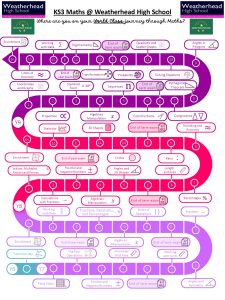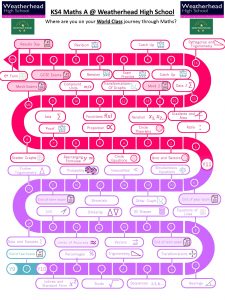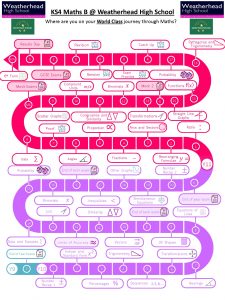Mathematics
The Mathematics department strives for all students to enjoy and succeed in mathematics. Our students achieve some of the best results in the country and we were described by Ofsted as ‘phenomenal’.
Learning Journey and Curriculum Overviews
Intent
Weatherhead is a place where students, regardless of their background, can access a high quality and challenging mathematics curriculum. We believe that all students can learn and succeed in mathematics given the appropriate learning experiences in and beyond the classroom. Every student is entitled to have the opportunity to master the key mathematical content and as such we have one curriculum for all. The curriculum is sequenced to focus on depth over breadth. We aim to spend more time teaching fundamental concepts to avoid the need to ‘re-teach’. Students are challenged to deepen understanding of a topic rather than being accelerated through content.
Our curriculum approach is based around four key principles: conceptual understanding, language and communication, mathematical thinking and problem solving. We aim to develop students’ conceptual understanding through use of various representations (concrete, pictorial and abstract). Clear mathematical communication, verbally and written is essential for students to be able to use mathematical language and notation to express and clarify their thoughts with others. During their time at Weatherhead, students will have the opportunity to develop habits of mind enabling them to think mathematically. With these key principles students will then be supported to apply their understanding from across the curriculum to solve problems in unfamiliar contexts.
We believe that all students should leave Weatherhead equipped with sufficient knowledge and the core mathematical skills they need for future learning. Through a detailed audit of the KS3 national curriculum and through the study of the principal strands (proportional reasoning, geometric reasoning, data handling, algebra and number) we have designed and sequenced a 5-year spiral curriculum which allows students to link established ideas to the learning of new concepts and supports them in understanding the coherent and connected nature of the subject. Our curriculum is cumulative so that concepts and skills learnt previously are applied and connected throughout the school year to consolidate learning; this continual recapping emphasises how each of the concepts interacts with others in mathematics.
The KS2 national curriculum, alongside regular contact with local Primary schools has enabled us to create a smooth transition between KS2 and KS3, looking at the way learners have been taught prerequisite topics in the past and how we can successfully build on this.
The purpose of our curriculum is to develop students into lifelong independent learners who can analyse, deduce, and problem solve, not only within mathematics, but who can apply these skills to the multifarious aspects of their wider lives.
Implementation
In order to implement our curriculum we have produced (and continue to develop) meticulously designed schemes of work which are delivered by passionate teachers who aim to increase students’ curiosity of mathematics and provide the support and challenge all students need. Our schemes of work provide support and information for teachers on pre-requisite knowledge/skills for each unit, pedagogical and sequencing guidance, how each topic fits into the bigger picture and support for use of concrete and pictorial representations.
Continuous professional development and collaborative planning allow teachers’ subject knowledge to be improved and developed. Weekly meetings allow us to share best practice and discuss the teaching and pedagogy of upcoming units, drawing on the experience of our team to support each other.
Teaching and learning within lessons and beyond the classroom is geared towards ‘Responsive Teaching’. We design and use questions/tasks to identify what students have understood and where they are struggling then respond and adapt our teaching as necessary to support students in improving. We place emphasis on the need for retrieval/revision throughout the year and specifically show students how to be independent in this and support them through lessons and homework.
Our ethos of responsive teaching and retrieval practice is conducted through a variety of initiatives and practices (see also ‘Responsive Teaching Overview’):
- Homework: Our main source of homework is through the Sparx Maths platform. Students are set a weekly online quiz to complete which is based on retrieval of skills and is personalised to each individual student. There are also support videos for students to watch which not only develops and consolidates their subject knowledge, but also promotes independence and fosters a student’s ability to regulate their own revision whilst imparting effective techniques for doing so.
- Low stakes quizzing: In class low stakes quizzes are used to assess understanding of concepts/skills learnt recently and also in the past. Questions and topics are chosen by teachers based on their assessment from lessons and in homework tasks.
- Retrieval starters: All lessons begin with key recap questions, generally from last lesson, last week, last term and last year. Teachers can ensure key skills are continually revisited and particular areas for improvement can be easily identified and inform future planning.
- Formative unit assessment: Short check-up assessments are completed in class for each unit covered and marked by teachers. These assessments allow teachers to see if students are ready to move on or to check their recall of a recent topic. Whole class feedback strategies are used to respond to these assessments.
Summative assessments take place at the end of each half-term. These assessments are cumulative over the course of the year and provide opportunities for students to revise topics and for us to assess the impact of the taught curriculum on learning. The data from these assessments is then analysed to ensure we are providing any support and intervention where it is required and to identify any areas of the curriculum where the curriculum and/or teaching and learning needs to be developed. These assessments are also used in a formative manner with specific feedback taking place after each assessment window and information being used to inform planning of lessons, starters and homework for the following half-term.
In addition to Sparx Maths homework, students in examination years complete written revision worksheets which provide opportunity for practice of key examination skills and examination style questions. At Key Stage Three, students complete fortnightly ‘Key Skills Starters’ which mainly focus on the practice and recall of multiplication/division facts and other vital number skills.
Outside of our core curriculum we also offer a variety of extra-curricular and enrichment opportunities to students which allow them to engage with mathematics in a meaningful and relevant way, experience how mathematics can be applied outside of the curriculum and to foster a love and passion for the subject. Examples include:
- UKMT individual and team challenges – competitions and weekly clubs
- Numeracy day
- Bright Sparx – competition and support club
- Preparation for university entrance examinations for KS5 students
- Times Tables Rockstars club
Impact
The impact of our curriculum can be seen in the excellent outcomes and destinations for our students at GCSE and A-Level.
At the end of Key Stage 4 our students perform well at all levels. As a fully comprehensive school in an area of grammar selection, we challenge and support our highest attaining students to achieve the highest grades 9-7 and have been the top performing non-selective school in the local authority for Mathematics grades at 9-7 for the last 2 years of examinations. We have also been the top performing non-selective school in the local authority for the last 2 years of examinations in terms of the proportion of students achieving a strong pass (grade 5+) at GCSE (2018/19).
In the Sixth Form we attract high numbers of students to study A-Level Mathematics (5 year average is 20.4 and the last 3 years have seen the highest numbers with 26, 25 and 20). We also offer Further Mathematics either as a 1-year AS-Level or a full 2-year A-Level qualification and have around 4/5 students opt for this each year. Our A-Level students enjoy and excel during their studies and a high proportion go on to study degrees in Mathematics or related subjects, many at prestigious universities:
|
2022 |
2021 |
2020 |
2019 |
|
Sanjita – University of Leeds, Mechanical Engineering Freya – University of Liverpool, Biological and Medical Sciences |
Abbie – University of Liverpool, Mathematics & Finance India – University of Manchester, Mathematics |
Benjamin – University of Cambridge, Mathematics Annie – University of Manchester, Mathematics |
Cerys – LJMU, Mechanical Engineering Molly – LJMU, Mathematics |
|
Hannah – Chester University, Software Engineering Miki – University of Leeds, Mathematics Caitlin – University of Chester, Criminology and Psychology |
Rachel – University of Liverpool, Civil Engineering Tasya – University of Liverpool, Engineering Pippa – Sheffield Hallam University, Economics |
Lucy – University of Swansea, Mathematics Lowri – Liverpool Hope University, Mathematics Nicola – University of Leeds, Mechanical Engineering |
|
|
Mai – University of Cambridge, Natural Sciences Kiera – University of Liverpool, Biological and Medical Sciences |
Ella – LJMU, Mechanical Engineering Lydia – Leeds Beckett University, Accounting & Finance |
Abi – LJMU, Accounting & Finance Ruby – LJMU, Accounting & Finance Ruby – LJMU, Business and Finance |
|
|
Claire – University of Bath – Mathematics Ellie – University of Chester, Chemical Engineering |
|
Sarbjit – University of Liverpool, Business Economics Lily – Liverpool Hope University, Computer Science |
|
|
Tyler – University of Liverpool – Physical Sciences Leighton – University of York, Computer Science Amy – Nottingham Trent University, Physics Hannah – Glyndwr University, Accounting and Finance Management Matthew – University of Central Lancashire – Mathematics Adel – University of Liverpool, Computer Science |
|
|
|
|
15 students (63%) |
7 students (27%) |
10 students (63%) |
2 students (14%) |
|
8 Russell Group |
4 Russell Group |
4 Russell Group |
|
Outside of our core curriculum we also offer a variety of extra-curricular and enrichment opportunities to students which allow them to engage with mathematics in a meaningful and relevant way, experience how mathematics can be applied outside of the curriculum and to foster a love and passion for the subject. These clubs and experiences are well attended and examples include:
- UKMT individual and team challenges – competitions and weekly clubs
- Numeracy day
- Sparx Maths – competition and support club
- Preparation for university entrance examinations for KS5 students
- Times Tables Rockstars club
- Chess club
We also have regular success with students who take part in UKMT competitions:
2021-22:
- Junior – All students in the top set in year 7 and 8 took part: 9 students achieved bronze.
- Intermediate – All students in the top set in year 9 and year 10 (x2) took part: 7 students achieved bronze, 1 student achieved silver.
- Senior – 5 students achieved bronze, 1 student achieved silver.
2020-21:
- UKMT – entry in to competitions continued in a virtual world:
- Junior Individual – 9 students took part in the individual competition, all achieved Bronze.
- Senior Individual – 12 Year 12 students took part in the individual competition, all achieved Bronze or Silver.
2018-19:
- Junior Individual – 8 bronze, 10 silver
- Intermediate Individual – 9 bronze, 6 silver
- Senior Individual – 1 gold certificate + entry in to Silver Kangaroo with top award of Merit achieved
- Junior Team Challenge – finished 6th out of 18 schools (including local selective school)
- Senior Team Challenge – finished 14th out of 18
Facilities
There are 14 Mathematics classrooms equipped with a computer, data projector and a Smartboard. ‘Giant’ whiteboards are used in all classrooms to promote confidence and resilience.
Support
- Highly qualified mathematics specialist teachers
- Small class sizes
- Homework support
- Extra-curricular clubs
- Intervention
- Additional teaching staff in classes
Extra-Curricular
Our Puzzle Club meets each week to play logic games and complete puzzles. The aim is to develop logical thinking whilst having fun. In addition we also run:
- Numeracy club
- Mathletes
- Gifted and Talented Clubs
- TT Rockstars



